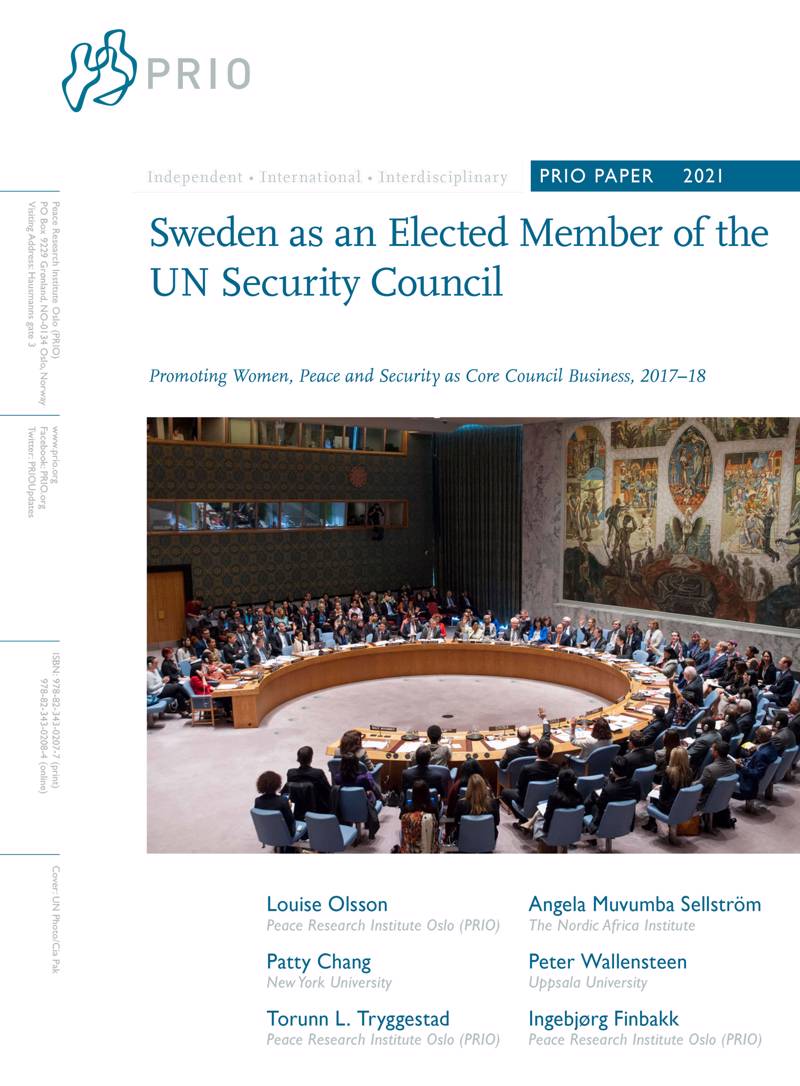
The PRIO paper on “Sweden as an Elected Member of the UN Security Council: Promoting Women, Peace and Security as Core Council Business, 2017–18” was successfully launched at a webinar on Wednesday the 23rd of June. The webinar brought together scholars and decision-makers to discuss the findings of the report, promote dialogue, and advance our knowledge on elected United Nations Security Council (UNSC) members.
The report seeks to contribute to a growing research agenda on internal UNSC dynamics and the role of elected states (E10s). To study the role of elected states is important as research indicates that there has been increased interest among states to hold one of the elected Council seats, yet our understanding of E10 strategies and effects remains more limited. Research also indicates that the possibilities for elected states to have an impact on UNSC outcomes can differ between policy areas. For its 2017–18 Council term, Sweden decided that it should promote the integration of Women, Peace and Security (WPS) into the mainstream of the UNSC's processes and decisions, to contribute to making WPS "core Council business". In fact, even though WPS is a policy area of growing importance for a number of elected states, there exists limited knowledge on the role of E10s in driving progress in the Council.
Addressing gaps in our understanding of E10 roles, strategies, and effects, this report makes two contributions: First, it provides insights into preparations for, and the situation in, the UNSC for elected members. It begins by discussing the assessments and decisions involved in forming the elected state's aims and strategy, and then outline four clusters of conditions that an elected state has to tactically maneuver during their term. Second, it structures and advance our knowledge of the potential effects a state can seek to achieve in order to better understand and study such efforts. The report then goes more in depth into one of the effects that Sweden sought to achieve: that is, the improved integration of WPS language in UNSC resolutions, in particular peace operation and political mission mandates, in order to positively affect the lives of women and girls in conflict and post-conflict areas.
At the report launch the speakers and authors of the report discussed elected states opportunity to affect core matters of international peace and security. Furthermore, how do these states assess opportunities and form aims and strategies for their terms? What conditions do they have to maneuver to promote their interests in a hierarchical Council? Finally, how can we understand and assess potential results from their efforts?
The speakers at the report launch included:
- André Mundal, Special Envoy for Women, Peace and Security, Ministry of Foreign Affairs, Norway
- Angela Muvumba Sellström, Senior Researcher, Nordic Africa Institute (NAI)
- Annika Söder, Ambassador and Special Representative of the Osce CiO for South Caucasus, Ministry for Foreign Affairs, Sweden
- Carl Skau, Deputy Director General and Head of Department for UN policy, Conflict and Humanitarian Affairs, Ministry for Foreign Affairs, Sweden
- Henrik Urdal, Director, Peace Research Institute Oslo (PRIO)
- Louise Olsson, Senior Researcher at PRIO and leader of the project "Sweden in the UNSC"
- Marianne Kress, Head of Department for Migration, Stabilization and Fragility, Ministry of Foreign Affairs, Denmark
- Mimmi Söderberg Kovacs, Head of Research and Development, the Folke Bernadotte Academy, FBA
- Patty Chang, Senior Researcher, PRIO and New York University
- Torunn L. Tryggestad, Director, PRIO Centre on Gender, Peace and Security
- Therése Sjömander Magnusson, Director, the Nordic Africa Institute.
The webinar recording will be available on the event page here.





